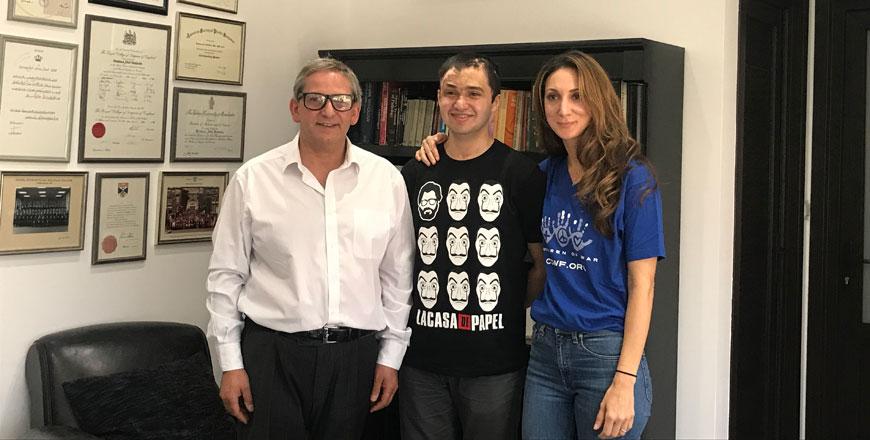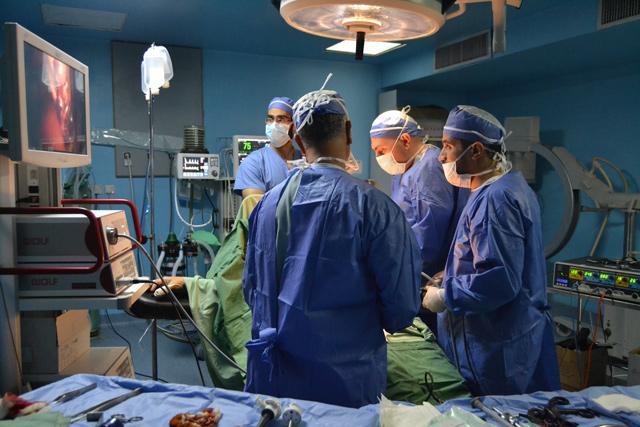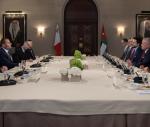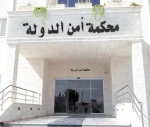You are here
Surgeons on mission to provide medical care for over 1,000 children in Jordan
By Mays Ibrahim Mustafa - Jul 24,2022 - Last updated at Jul 24,2022
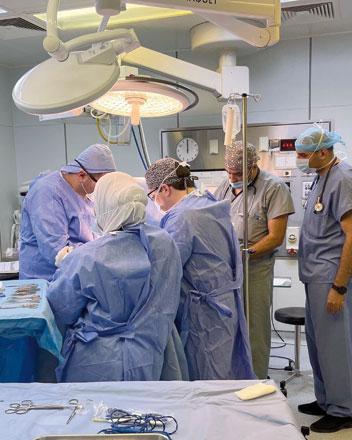
Surgeons from the Children of War Foundation are seen during an operation (Photo courtesy of COWF)
AMMAN — On July 17, a team of volunteer surgeons from the US arrived in the Kingdom as part of a mission lead by the Children of War Foundation (COWF) to provide medical care for 1,000 underprivileged children from refugee camps and pockets of poverty in Jordan.
Abu Faisal cried tears of joy while he gave out candy in the Farah Hospital in Amman after his four-year-old son’s successful brain surgery.
“There are no words that can describe what we’re feeling. He’s been suffering for over two years but we couldn’t afford the surgery, as it costs roughly JD15,000,” he told The Jordan Times.
Andrew Wexler, an American craniofacial plastic surgeon volunteer, also spoke with The Jordan Times.
“The love that parents show for their children when you operate and help them is an energy that you feel in yourself and it’s as addicting as a drug. It makes you want to come back and do it time and time again,” he said, noting that helping a child is also helping his parents and community.
“It’s like throwing a stone in the water where it makes concentric rings… you cannot help the whole world, but if you throw enough stones into the water, you can make a difference,” Wexler added.
“All of us do this to help others. It’s why we got into medicine in the first place,” Jeffery Hammoudeh, a paediatric craniofacial surgeon volunteer and a co-founder of COWF, told The Jordan Times.
He added that these international missions are also an “invaluable” two-way learning experience, where surgeons can exchange expertise and learn from one another.
This mission includes surgeons from various specialties, including urology, plastic surgery, neurosurgery, ophthalmology and dentistry, according to Hammoudeh.
The foundation began its work in 2010 with the story of Hashem Hamzeh, an Iraqi child who had suffered an intracranial injury from a terrorist attack and had been in a coma for 55 days. With the help of family and friends in Jordan, COWF brought him from Baghdad to Amman and then to the US, where he received the necessary treatment, according to the founder of COWF Jordanian American Amel Najjar.
“All surgeons were sure that I was going to die. Only COWF believed in me and gave me hope. They inspired me to always look for ways to help others and change their lives just like they changed mine,” Hamzeh, who is currently doing a bachelor’s in computer engineering in Turkey, told The Jordan Times over the phone.
Over the past 11 years, COWF has provided access to medical care for over 20,000 children in Jordan, Mexico, Panama, Afghanistan, Ukraine, Poland, Lebanon, Palestine, Kenya, Uganda, Ethiopia, Yemen and Haiti, according to Najjar.
Nadia Naffa, Head of the Jordan Mission at COWF, noted that Najjar started this foundation “to give back, not only to her homeland, but to all the children of the world, regardless of their race, religion and nationality”.
“It’s a pure international charitable collaboration; we have thousands of volunteers all over the world in hospitals, schools and universities who are motivated by the desire to help children,” she told The Jordan Times.
Naffa also pointed that COWF aims to create a local base in every country it visits, so they can continue to do this work on their own “to ensure sustainability and promote social responsibility”.
The US team has performed 100 successful surgeries, Najjar said, adding that the mission was sponsored by Agility, a logistics company based in Kuwait.
The US team departs on Sunday, and COWF’s team of Jordanian volunteers will provide postoperative care and continue to perform surgeries for the other waitlisted children, according to Naffa.
Khaldoon Haddadeen, a Jordanian plastic surgeon who has been volunteering with COWF for 10 years, told The Jordan Times: “What we do is a way of giving back and that’s the soul of medicine”.
COWF also supports a remote education programme for 151 students, including young mothers and refugee children who don’t have access to education by providing them with tablets, an Internet connection and an access to the online learning platform Abwaab as well as virtual coding workshops in partnership with the Stanford University, Najjar said.
It also funds a school made from a tent on a refugee camp near Jordanian farms in Mafraq, founded by one of its volunteers Mahmoud Sadaqa, who is a refugee himself and taught by one of the mothers on the camp who volunteers to help her community, she continued, noting that “access to healthcare and education are the fundamentals of a good and happy life”.
Related Articles
AMMAN — The life of Iraqi Hashem Hamzeh took a dramatic turn eight years ago, when he and his family were victims of a terrorist attack as t
AMMAN — Children of War Foundation (COWF) will launch a “first ofits kind” initiative with Jordan-based Abwaab Edu, experts in remoteeducati
AMMAN — Over 7,000 refugees and vulnerable Jordanians have received free medical treatments and surgeries over the past week through the sec


